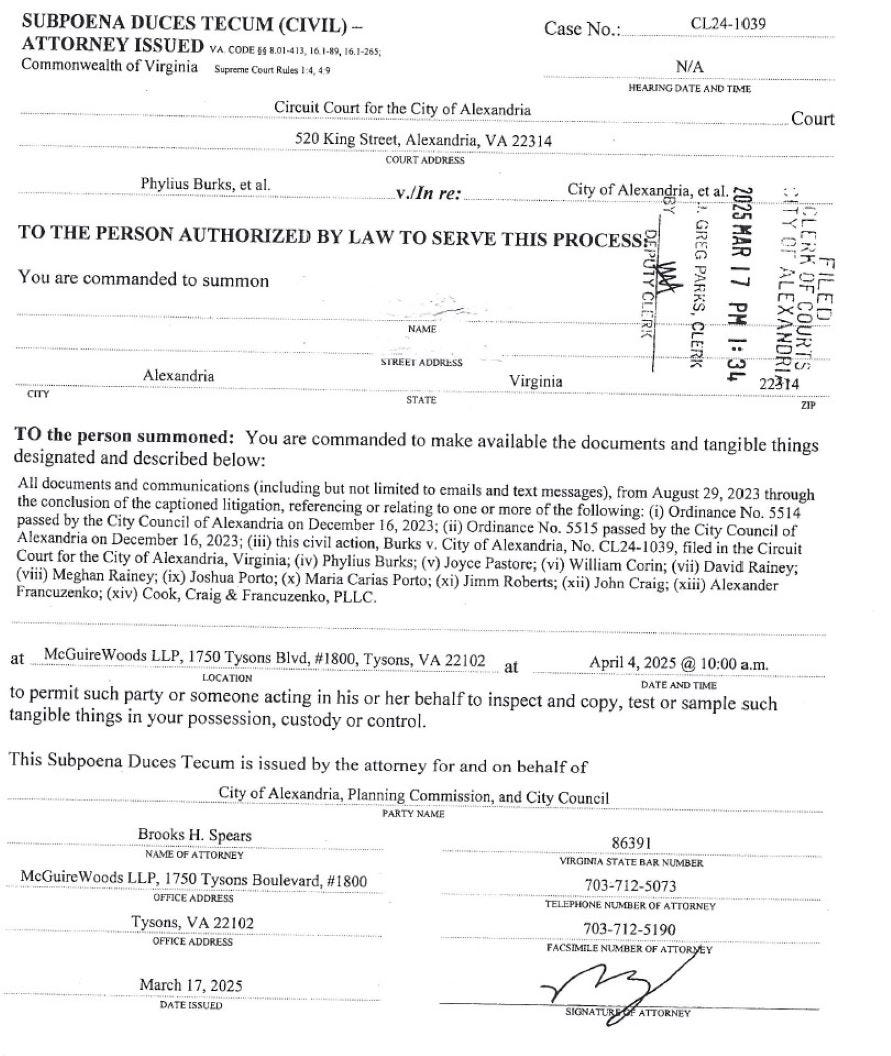The subpoenas issued on behalf of the defendants, the City of Alexandria and the Planning Commission, in the Zoning for Housing lawsuit (Burks, et al. v. City of Alexandria, et al, CL24-1039), are controversial. As of the week of April 21, the case docket showed that seven subpoenas were served on individuals who are nonparties, five of whom are directors of the anti-ZFH Coalition for a Livable Alexandria which was dismissed as a plaintiff for lack of standing.
Some subpoena recipients, and others, assert that the subpoenas are retribution, or lawfare. They argue that the defendants weaponized the legal system to harass residents who objected to the elimination of single-family zones in the ZFH zoning code amendments adopted by the City Council in November 2023.
The argument that the subpoenas, which contain broad information requests, are a fishing expedition overlooks the reality that civil discovery is designed as a fishing expedition. The fishing license is broad, but not unlimited.
Supreme Court of Virginia Rule 4.1 (b) (1) states, “It is not ground for objection that the information sought will be inadmissible at the trial if the information sought appears reasonably calculated to lead to the discovery of admissible evidence.”
At first, the purpose of the subpoenas is hard to understand because the actors in the ZFH case are the City and its officials. The case turns on whether the City had the power to enact the ZFH amendments and whether it did so in a legally appropriate manner. How could communications or other information from residents have any evidentiary value if the case will be decided on the administrative record—the cumulative factual account of the actions or omissions by City personnel that formed the basis for ZFH’s enactment?
There appear to be two possible grounds for the subpoenas.
First, the subpoenas could reveal statements that could be used to impeach, or attack the credibility of, a witness who testifies at trial inconsistently with what they said in the past. This is consistent with the withdrawal a few weeks ago of a ZFH case subpoena to a nonparty.
Second, the ZFH case’s 30-page complaint alleges acts and omissions by the City, but it also alleges legal conclusions, meaning that the City’s conduct violated legal standards. The complaint alleges that ZFH’s enactment was arbitrarily and capricious and ultra vires, meaning beyond the City’s authority. The defendants may argue that they are entitled to the subpoena recipients’ communications to ascertain whether the communications contain evidence that the City acted beyond its authority, or arbitrarily and capriciously.
The City’s wily outside counsel, McGuireWoods, may assert other grounds for the subpoenas in response to an April motion to quash a subpoena filed by a nonparty recipient.
No prediction is made here about the resolution of issues relating to the subpoenas. The defendants will likely argue that the principle that “the public has a right to every man’s evidence”—described in the United States v. Nixon Supreme Court case about a subpoena for the Watergate tapes—is foundational in the legal system and thus the subpoenas should be upheld even if their justification is flimsy.
Other factors contributed to the issuance of subpoenas on behalf of the defendants for communications, which may have been intended to be private, by residents objecting to ZFH who are arguably funding the City’s defense of ZFH through their taxes.
A subpoena recipient told me that subpoenas were also issued to objecting residents in Arlington’s Missing Middle zoning case—which is now on appeal after a ruling for the residents—for impeachment purposes. The inherent caution of most lawyers would lead to a recommendation to issue subpoenas in the ZFH case.
McGuireWoods’ duty is to do everything ethically possible to win the ZFH case. The City, as the client, would probably be reluctant to reject a recommendation to issue subpoenas by a law firm it is paying, or will pay, fees of several hundred thousand dollars.
Matters may have been compounded because subpoenas were issued during a period when the case was judgeless, meaning after the resignation of Judge David Schell and before the recent appointment of Judge H. Thomas Padrick, Jr. Judges generally dislike discovery disputes, but until recently there has been no judge to review discovery matters.
The ZFH subpoenas to Alexandria residents echo a question present in other contexts: If something can be done legally, does that automatically mean that it should be done?
The writer is a former lawyer, member of the Alexandria School Board from 1997 to 2006, and English teacher from 2007 to 2021 at T.C. Williams High School, now Alexandria City High School. He can be reached at aboutalexandria@gmail.com and free subscriptions to his newsletter are available at https://aboutalexandria.substack.com.
Thanks for reading About Alexandria!
Subscribe for free to receive new posts.
.





interesting but over my pay grade